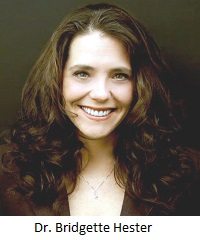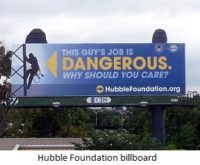
The non-profit foundation she began in 2012, helps families of tower climbers who have been severely injured or killed on the job.
“I take each case on an individual basis, whether it’s helping a family get a body get home or helping with funeral costs,” for example. Hester says there’s often a lag time between the death and when federal assistance like Social Security payments kick-in.

“Just writing a check seems a little cold to me. I want to try and talk to them,” she explains, adding she usually writes a letter to a family soon after an accident.
That includes sending what she calls a “comfort box,” usually containing a book on grief, chocolates, a blanket and pajamas, because: “Eventually the calls stop and people don’t visit anymore,” she says.
Hester knows from personal experience. Her then-husband, Jonce Hubble, died in 2010 in a tower accident. He and his partner Barry Sloan were killed when a third-party bucket truck operator backed the vehicle into the guy wires and both men fell over 40 feet.
Hester used part of the money from an insurance settlement to start the foundation. Her day job is teaching psychology and sociology at Strayer University and the College of Coastal Georgia, with a mix of on-campus and online classes. But her mission is promoting tower safety, through the foundation, which includes her articles, events, and an online store.
Hester does not take a salary and estimates the foundation’s administration costs are under 10 percent.
She says the foundation has raised some $270,000 in donations since its inception. Much of that comes from individual wireless associations, like the Pennsylvania and Georgia Wireless Associations, and through family foundations.
Families find their way to Hester through social media outlets, like Facebook and through climbers, or their companies.
Asked what families who have lost a loved one to a tower death want most, she said: “They want it to mean something.” Some families channel their grief by starting a local scholarship fund or volunteering for the Hubble Foundation or through another avenue.
Bridgette re-married in 2012 to Ronny Hester, a friend of Jonce’s. Ronny is executive director of the foundation.
The work, and her faith, helps Bridgette, too.
The foundation has distributed some 60 scholarships to children (and one widow) of tower workers who have either been seriously injured or killed. Dirk Remington died in 2009, she recalled, and the foundation awarded his son D.J. and daughter Denny the first scholarships.
She receives calls, letters and other kinds of messages from grateful families, and stays in touch. She combs through OSHA and other records to learn of climber deaths and also received a database from a researcher when she started the foundation.
When asked by Inside Towers what she would most want the industry to know about the foundation’s work, she paused, and said: “When somebody dies it’s not a finite point in history for the family. It’s something they carry with them for the rest of their lives.”
“We try to build a relationship with them. It’s not about the funds, it’s about building the relationship and letting the family understand somebody is going to remember them and their loved one.”
That’s why she makes memorial pages on social media that families can see and change if they wish.
The foundation is based on a Bible verse, Isaiah 1:17, about taking care of widows and orphans, she explains. “That’s why I’m here. I’m supposed to be a servant.”
To learn more about the Hubble Foundation, based in Grant, Alabama, visit: http://www.hubblefoundation.org/ or call 256-506-3354.
By Leslie Stimson




Reader Interactions